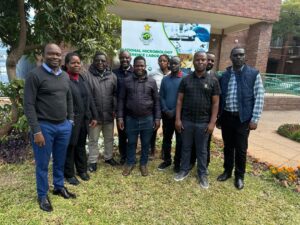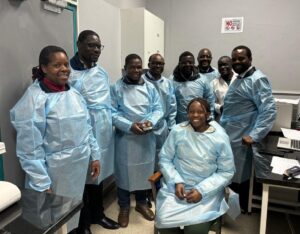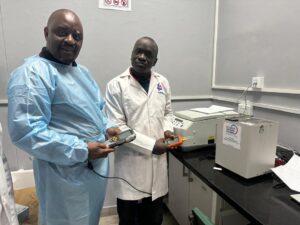 This week, the African Society for Laboratory Medicine (ASLM) in collaboration with Biologic Calibration Solutions Limited, and with support from the United States Centers for Disease Control and Prevention (CDC) President’s Emergency Plan for AIDS Relief (PEPFAR), facilitated calibration of laboratory standards at the National Laboratory Equipment Calibration Centre (NLECC) at the National Microbiology Reference Laboratory (NMRL) in Harare, Zimbabwe. This activity was a continuation of the work that ASLM has already implemented in Mozambique, Malawi, Tanzania, and Ethiopia over the past four weeks.
This week, the African Society for Laboratory Medicine (ASLM) in collaboration with Biologic Calibration Solutions Limited, and with support from the United States Centers for Disease Control and Prevention (CDC) President’s Emergency Plan for AIDS Relief (PEPFAR), facilitated calibration of laboratory standards at the National Laboratory Equipment Calibration Centre (NLECC) at the National Microbiology Reference Laboratory (NMRL) in Harare, Zimbabwe. This activity was a continuation of the work that ASLM has already implemented in Mozambique, Malawi, Tanzania, and Ethiopia over the past four weeks.
Strengthening equipment maintenance and calibration capacity is critical for Laboratory Systems Strengthening efforts across Africa. Well-maintained and calibrated equipment ensures that laboratories can consistently produce high-quality results. This not only enhances the lab’s operational capabilities and improves the quality of its diagnostic services, but also supports better disease surveillance, timely public health responses, and more informed decision-making in healthcare policy. Calibration ensures quality assurance that complies with international standards like ISO 17025.
 However, many laboratories across Africa face significant challenges due to inadequate local (regional and national) calibration facilities. The scarcity of calibration centres, skilled biomedical engineers, insufficient infrastructure, and the high cost of calibration equipment have impacted the ability to maintain the accuracy of laboratory tools across labs in the region. To address the critical gap in regional calibration and maintenance capacity, ASLM, in collaboration with partners such as CDC-PEPFAR, is spearheading efforts to build a cohort of trained and qualified biomedical engineers across the continent. Central to these efforts is the focus on local capacity-building through the provision of calibration equipment, technical training, and comprehensive mentorship programmess.
However, many laboratories across Africa face significant challenges due to inadequate local (regional and national) calibration facilities. The scarcity of calibration centres, skilled biomedical engineers, insufficient infrastructure, and the high cost of calibration equipment have impacted the ability to maintain the accuracy of laboratory tools across labs in the region. To address the critical gap in regional calibration and maintenance capacity, ASLM, in collaboration with partners such as CDC-PEPFAR, is spearheading efforts to build a cohort of trained and qualified biomedical engineers across the continent. Central to these efforts is the focus on local capacity-building through the provision of calibration equipment, technical training, and comprehensive mentorship programmess.
A key initiative under these efforts is the development of a specialized training and qualification curriculum and examination for biomedical engineers, administered by the ASLM Academy. The ASLM Academy will oversee the training, certification, and ongoing professional development of these engineers, to equip engineers with the necessary skills and knowledge to ensure they meet international standards and maintain high quality diagnostics.
 Since 2019, ASLM has been providing technical support to the National Laboratory Equipment Calibration Centre through the provision of calibration equipment, training, equipment calibration, and mentorship. At this week’s activity, ASLM AG Director of Programmes, Dr Talkmore Maruta, expressed ASLM’s commitment to supporting NLECC’s accreditation mission and becoming a regional calibration centre. In his remarks, Mr Michael Makaya, National Laboratory Quality Coordinator at the Zimbabwe Ministry of Health, thanked ASLM for their continued support.
Since 2019, ASLM has been providing technical support to the National Laboratory Equipment Calibration Centre through the provision of calibration equipment, training, equipment calibration, and mentorship. At this week’s activity, ASLM AG Director of Programmes, Dr Talkmore Maruta, expressed ASLM’s commitment to supporting NLECC’s accreditation mission and becoming a regional calibration centre. In his remarks, Mr Michael Makaya, National Laboratory Quality Coordinator at the Zimbabwe Ministry of Health, thanked ASLM for their continued support.
By improving local capacity for equipment maintenance and calibration, laboratories can ensure the validity of their diagnostic results. Building this cohort of skilled biomedical engineers, in conjunction with ASLM’s efforts to establish and strengthen regional calibration centres, will increase the availability of reliable, cost-effective, and sustainable equipment maintenance and calibration services across the continent.

